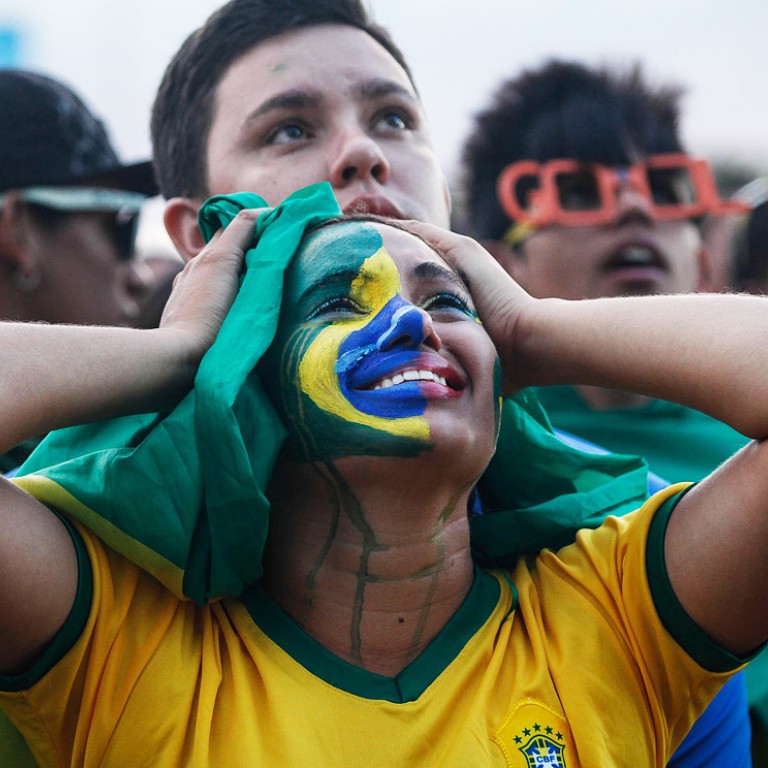
Impact of Brazil's crushing World Cup defeat to extend far beyond field
Brazil's crushing defeat by Germany upsets the theory that home loss would lead to market rally, though it may still cost Rousseff next election
Conventional wisdom has been that a Brazil loss at home in the World Cup would be a positive thing for the country's financial markets.
A defeat, the argument went, would sour the national mood and prompt voters to oust Dilma Rousseff, a president who has sunk the nation's economy into stagflation.
But Tuesday's 7-1 loss to Germany was so crushing that it upends that theory, according to Geoffrey Dennis, the head of emerging market strategy at UBS, who has been covering Brazil since the early 1990s.
The defeat would hurt Rousseff's chances at re-election in October, he said, but the lopsided outcome could also deal a blow to investor and consumer confidence in a country that obsesses about its national pastime.
"It is such a humiliating defeat that you wonder whether it will have a negative impact on Brazilians' psyche," Dennis said in Boston.
"It's going to confirm to the people that, 'look, our economy is struggling, we cannot get any growth, now we don't even have a decent football team either'."
With Brazilian markets closed yesterday for a holiday, the impact on asset prices might show up in the country's overseas bonds as well as American depositary receipts of state-controlled companies such as Petroleo Brasileiro.
The benchmark Ibovespa stock index has gained 19 per cent from a low on March 14 as Rousseff's declining popularity sparked speculation that a new administration would take over and help jumpstart the economy.
Since Rousseff took office in 2011, growth has decelerated to an average annual rate of 2 per cent, the slowest since the presidency of Fernando Collor, who resigned in 1992 amid corruption allegations.
Her policies aimed at reviving the economy have stoked annual inflation exceeding 6.5 per cent, the upper limit of the government's target range.
The semi-final loss, the worst defeat in Brazil's history, dashed the country's hopes of overcoming the national tragedy of losing the final match of the 1950 World Cup at home. Brazil will now play for third place in the tournament on Saturday.
A Datafolha survey published last week showed that 38 per cent of Brazilians would vote for Rousseff in the October 3 election, down from 44 per cent in February. Aecio Neves of the Brazilian Social Democracy Party had 20 per cent support.
Thousands of people demonstrated before the World Cup, decrying US$11 billion in spending to host the tournament in a country where 7.2 million people still live on US$1.25 or less a day. More than one million people took to the streets last year to protest against inflation, corruption and poor public services.
As the Brazilian team was embarrassed by its opponents, some in the stadium jeered Rousseff, who had promised to host the "cup of cups". She wrote on her Twitter account that she was saddened by the defeat, also using lyrics of a popular Brazilian song to urge the nation to overcome the loss.
The game might ultimately cost Rousseff the election, which would in turn spur a 25 per cent rally in Brazilian stocks, according to Alberto Bernal, the head of research at Bulltick Capital Markets.
"This is going to be catastrophic for the national mood," Bernal said in Miami. "If the market sees the potential that Dilma will not be re-elected, then it will rally in a big way."
Dennis, a Briton who supported Germany because his grandchildren live there, said the psychological burden of the defeat may take a while for Brazilians to overcome.
"I do not think this result leads to a knee-jerk rally in markets," Dennis said. "Brazil has to get over this massive loss."

